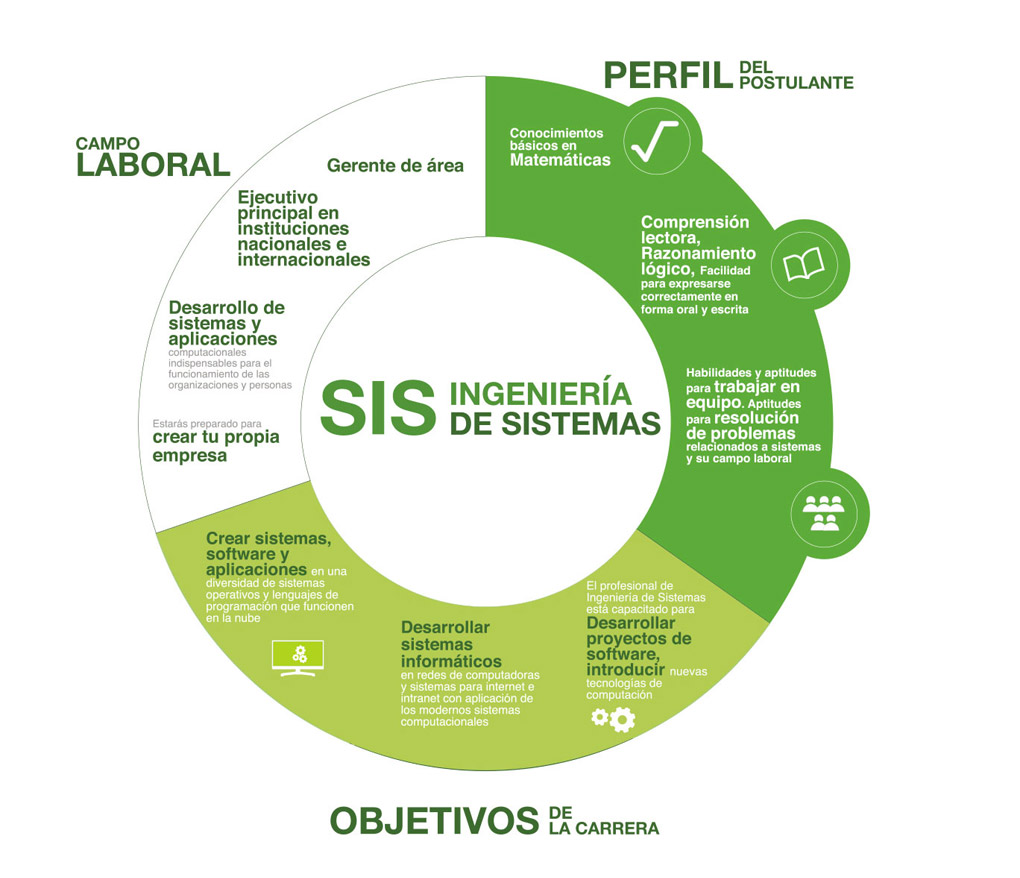
The degree of Systems Engineering was one of the four founding degrees of the UPSA in 1984. It was created with the objective of training professionals in the development of computer systems and software, designing data bases, with a solid formation in basic sciences. At present it is in its third curricular versión. The basic lines of the first program were programming, development of computer systems, study of computer languages, data bases, operative systems, optimization and modelling.
In its second version (1989) this degree was strengthened with the recommendations of the ACM (Association for Computing Machinery) and the IEEE (Institute of Electrical and Electronics Engineers), in addition to what we observed the market needed. In its third version (2000), with growth and development of software, application of data bases and networks, each of these areas was strengthened and developed due to demand; at the same time that management tools were updated, destined to the development of apps on the Internet utilizing commercial and freeware software.
As a Systems Engineer you will be prepared to create your own company or work as an area Manager or main Executive in national and international institutions, developing essential computer systems for the operation of organizations.
You will also be able to create systems, software and apps in a diversity of operative systems and programming languages that operate in the cloud, in mobil devices, PCs, tablets and intelligent phones; integrating all types of real systems and apps that will allow organizations and people to perform with total connectivity and security in a hyperconnected and globalized world.

Plan
de
estudios
| PRIMER SEMESTRE | Fundamentos de Matemática | Álgebra I | Contabilidad General I | Pensamiento Crítico | Fundamentos de TI | Fundamentos de la Administración de Empresas | |
|---|---|---|---|---|---|---|---|
| SEGUNDO SEMESTRE | Calculo I | Álgebra II | Contabilidad General II | Fundamentos de Programación | Redes I | Electrónica Digital | |
| TERCER SEMESTRE | Calculo II | Estadística I | Contabilidad de Costos | Estructura de Datos | Redes II | Sistemas Digitales | |
| CUARTO SEMESTRE | Calculo III | Estadística II | Matemática Financiera I | Programación Aplicada | Sistemas Operativos | Interculturalidad, Ciudadanía y Género | |
| QUINTO SEMESTRE | Investigación Operativa I | Análisis Estadístico de Calidad | Bases de Datos | Estructura de Datos Avanzadas | Laboratorio de Sistemas Operativos I | Laboratorio de Redes I | Certificación de idioma Inglés |
| SEXTO SEMESTRE | Investigación Operativa II | Análisis para la toma de Decisiones | Ingeniería de Software | Laboratorio de Sistemas Operativos II | Electiva I | Ética y Valores | |
| SÉPTIMO SEMESTRE | Modelación y Simulación | Desarrollo de Aplicaciones Web | Sistemas de Información | Computación Móvil y Ubicua | Virtualización y Computación en la Nube | Laboratorio de Redes II | Pasantía Profesional (300 hrs) |
| OCTAVO SEMESTRE | Evaluación de Proyectos de Ingeniería | Gestión de la Calidad Total | Gestión de Base de Datos | Ingeniería de Calidad y Pruebas | Electiva II | ||
| NOVENO SEMESTRE | Sistemas Inteligentes e Innovación | Gestión de Sistemas | Modalidad de Grado I | ||||
| DÉCIMO SEMESTRE | Modalidad de Grado II |
Materias
Electivas
-
Teoría de la Organización
-
Administración de Producción y Operaciones I
-
Gestión de la Innovación Tecnológica y Emprendimiento
-
Mecánica
-
Fluidos, Calor y Sonidos
-
Electromagnetismo y Ondas
-
Cableado Estructurado
-
Telecomunicaciones I
-
Electrónica I
-
Electrónica II
-
Organización y Sistemas
-
Fundamentos de Marketing
-
Derecho Comercial, Laboral y Tributario
-
Comunicación Corporativa
-
Administración de Recursos Humanos
-
Investigación de Mercado
-
Writing Lab
-
Life Plan To Excellence
-
TecnoUPSA Feria de Ciencias y Tecnología
-
Capítulo Estudiantil ACM (Asociation for Computing Machinery)
-
Capítulo Estudiantil MSP (Microsoft Student Partner)
-
Laboratorio de Redes y Telecomunicaciones
-
Laboratorio de Computación en la Nube
-
Laboratorio de Base de Datos
-
Laboratorio de Computación
-
Plataforma Virtual
-
Biblioteca Digital ACM/IEEE
-
Incubadora de Empresas










